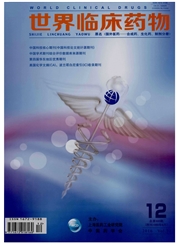

 中文摘要:
中文摘要:
目的探讨白藜芦醇(resveratrol)对肝脏损伤的保护作用。方法 50只小鼠随机分成5组,每组10只,分别为:正常对照组、模型组、白藜芦醇低剂量组、白藜芦醇中剂量组、白藜芦醇高剂量组。实验前两周,白藜芦醇组各灌服相应的药物一日0.1 ml/10gBW。正常组和模型组则灌服0.5%羧甲基纤维素溶液一日0.1 ml/10gBW。第14天灌服结束后1小时,除正常组外各组动物均从尾静脉注射刀豆蛋白溶液一日0.05 ml/10gBW,正常对照组动物则尾静脉注射生理盐水一日0.05 ml/10gBW。测定ALT、AST;取肝右叶置于4%多聚甲醛4℃下固定,用于HE染色。结果肝脏肉眼观察及HE染色后病理观察均提示模型组肝脏损伤明显重于白藜芦醇组,且模型组血清ALT、AST水平与对照组相比升高,差别具有显著统计学意义(P〈0.01)。白藜芦醇高、中、低剂量组血清ALT、AST水平均较模型组下降,差别具有显著统计学意义(P〈0.01)。白藜芦醇各剂量组间的差异也无统计学意义。与正常组相比,不同浓度白藜芦醇治疗组中炎症因子IL-2、IL-6、TNF-α表达量增加,各浓度间无明显差异。与模型组相比,各浓度组中炎症因子表达量明显下降。结论白藜芦醇对刀豆蛋白诱导的急性肝损伤有明显的保护作用。
 英文摘要:
英文摘要:
Abstrct: Objective To study the protective effect of resveratrol on hepatic damage. Methods Fifty male mice were namely divided into five groups: control group; model group; Resveratrol(Res) high dosage group; Res moderate dosage group and Res low dosage group. At the first two weeks of the experiment, the mice of Res group were received 0.1 ml/10gBW per day by oral administration. While other mice were received 0.5% carboxymethyl cellulose solution 0.1 ml/10gBW per day. At the fourteenth day, after oral administration one hour, the mouse were injected from caudal vein by Con A 0.05 ml/10gBW except control group. Control group were received saline 0.05 ml/10gBW by caudal vein injection. Aminotransferase(ALT) and aspartate aminotransferase(AST) were detected. The right lobe of the liver was fixed in 4% paraformaldehyde at 4 ℃ for hematoxylin-eosin(HE). Results Visually observed, liver damage in model group was more serious than resveratrol group. Hepatic pathological damage in model group was more serious than resveratrol groups after HE staining. Compared with control group, the levels of ALT and AST in model group rised a lot, the difference was statistically significant(P〈0.01). Compared with model group, the levels of ALT and AST in resveratrol high, medium and low dosage groups decreased, and the difference was statistically significant(P〈0.01). The difference between the resveratrol dosage groups was not statistically significant. Compared with the normal group, the expression of inflammatory cytokines IL-2, IL-6, TNF-alpha increased in different concentrations of resveratrol treatment group, and there are no significant differences between the various concentrations. Compared with model group, the expression of infl ammatory cytokines in various concentrations decreased significantly. Conclusion Resveratrol has significant protective effect on acute hepatic damage induced by concanavalin.
 同期刊论文项目
同期刊论文项目
 同项目期刊论文
同项目期刊论文
 期刊信息
期刊信息
